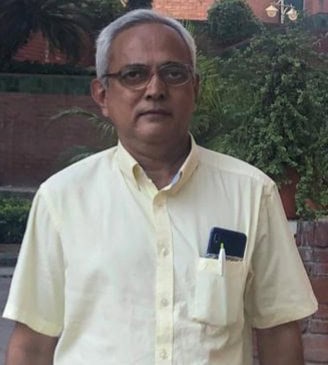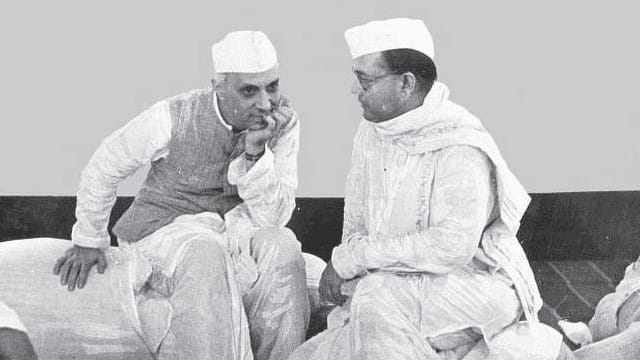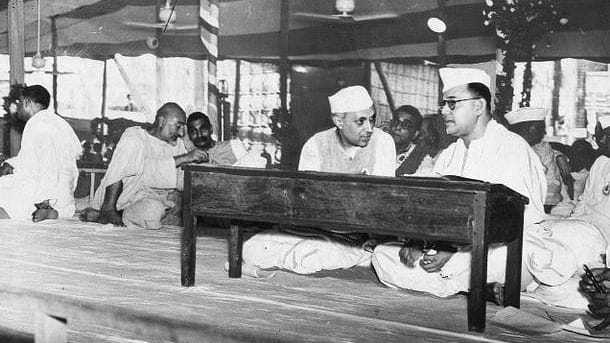
With eye on the upcoming West Bengal Assembly elections due in April-May this year, the BJP has stepped up its efforts to appropriate the legacy of Netaji Subhash Chandra Bose. His 125th Birth Anniversary commences on January 23, 2021, coinciding with the impending State Assembly elections due in April-May.
It has come in handy for Prime Minister Narendra Modi to make a renewed bid to stake claim to Bose legacy, as BJP does not have illustrious history or leadership and ends up borrowing leaders from the Congress pantheon.
In fact, it gives reason for Congress men and women to smile, as even the detractors need to borrow from their pantheon and eulogize their leaders of the Grand Old Party of India. Perhaps, it is greatest tribute to the Congress.

The BJP tries to identify leaders in the Congress, with perceived differences of opinion, either with Mahatma Gandhi or Pandit Jawaharlal Nehru. Sardar Patel and Netaji Subhash Chandra Bose are notable in this category. But what the Saffron Party keeps forgetting is that Patel or Bose, they are all Congress leaders, first and last, with honest, healthy and democratic differences of opinion on the line of action, but not on basic ideology or on the leadership of Mahatma Gandhi and Pandit Jawaharlal Nehru.
The problem with the Saffron Party Establishment is that it cannot invoke with justifiable pride even the name of its own founder-leader Shyama Prasad Mooherjee, who, too, belongs to West Bengal. Or, for that matter, they cannot invoke, with pride, any of their other leaders, like Madhav Sadashiv Golwalkar or Vinayak Damodar Savarkar.

Take the instance of the founder of the BJP precursor, the Jan Sangh founder S P Mookherjee, who joined hands with the Muslim League to form the Government in West Bengal, with A K Fazl-ul-Haq as Bengal Chief Minister, to become his Finance Minister, in 1941.
That was the time the Congress had pulled out of the Provincial Governments to protest against the British; and that was the time S P Mookherjee had joined hands with the Muslim League that had passed Pakistan Resolution and went on to support the British.
Prime Minister Narendra Modi’s efforts to try to appropriate Bose legacy are in step with the initial efforts of BJP veteran L K Advani, who started the effort with the Swarna Jayanti Rath Yatra in 1997, during the Golden Jubilee of the Indian Independence.
The Saffron Party played cheap politics even over the death of Subhash Chandra Bose in a plane crash. Bose ashes are preserved in an urn in the Renko-Ji Temple in Tokyo in Japan and it is a settled fact. But they cannot desist from resorting to gimmickry.
Come to think of it. There is nothing in common between Bose and the Saffron Brigade. In fact, Netaji Subhash Chandra Bose was left-leaning that is an anathema for the Right-wing BJP.
Bose spoke in Urdu-mixed Hindustani, which is a red-herring for the BJP, which has sought to destroy it with it’s such highly artificial Sanskritized Hindi. Bose christened his Indian National Army (INA) as Azad Hind Fauj, not Swatantra Bharat Sena. He gave the slogan, Jai Hind, which the successive Prime Ministers, belonging to the Congress, echoed from the ramparts of the Red Fort on Independence Day and on numerous other occasions; which the BJP has wilfully abandoned, never uttering it even once.
The BJP seeks to harp on a perceived divide between the Congress and Netaji Subhash Chandra Bose that never existed. Bose was a comrade-in-arms of Pandit Jawaharlal Nehru, both of whom were Anti-Right. Bose revered Mahatma Gandhi as father-figure and he had christened Gandhiji as Bapu.
Subhash Chandra Bose rose from the Congress ranks of the party and went on to become the Congress President twice, in Haripura Congress in 1938 and in Tripuri Congress in 1939.
In 1939, in a keenly-fought Congress Presidential election, Bose defeated Mahatma Gandhi’s nominee for the post, Dr Bhogaraju Patthabhi Sitaramayya. Gandhiji gracefully conceded defeat, saying, “Patthabhi’s defeat is my defeat.”
It was the greatest democratic election, of which the Congress can justifiably be proud; and the BJP never has a really elected President, but a President nominated from Nagpur.
In 1919, Gandhiji launched the Non-Cooperation Movement and he remained eversince the unquestioned leader of the Congress.
In 1939, for the first time, the two-decade-long unchallenged and unbroken grip of Gandhiji on the Congress, was seriously brought into question.
In fact, Bose won the Congress Presidential election, defeating the nominee of Gandhiji, but he never challenged the supremacy of Gandhiji.
Netaji wanted Mahatma Gandhi to nominate Members of the Congress Working Committee (CWC) for him, recognizing the fact that all the Congress men and women look up to Gandhiji.
When Gandhiji refused to do so, Bose resigned, saying the Congress needs Gandhiji more, than him. It was in deep deference to the Mahatma that he quit as Congress President, not out of spite or antagonism.
Later, when he quit the Congress, it was in keeping with his honest disagreement with the ways of Gandhiji of winning Indian Independence through Non-Violence. He believed in waging a war to win Indian Independence.
When Bose was in Germany to meet Adolf Hitler for help to fight the British, Gandhiji was asked to give his opinion. Gandhiji replied that Bose patriotism is beyond doubt. It shows Gandhiji recognized Bose had honest ideological disagreement, but he never questioned Bose integrity.
It is worth recalling that Bose addressed Mahatma Gandhi as Bapu and as Father of the Nation. It revealed the deep reverence that Bose had for Gandhiji.
Long before the Indian Independence, Nehru and Bose worked together. They represented the more militant, Left-wing of the party against the more compromising, Right-wing faction.
Congress President Netaji Subhash Chandra Bose started the Congress Planning Committee, with Pandit Jawaharlal Nehru as the Chairman.
After the Indian Independence, Nehru went on to confer statutory status on it and set up the Planning Commission, with the Prime Minister as the Chairman. Prime Minister Modi went on to abolish the Planning Commission.
Even after quitting the Congress, Bose opted for launching the radical Forward Bloc. There is no way the extreme Right can aware claim ki kinship with Netaji Subhash Chandra Bose, who essentially remained a Congressman. Bose was not fully convinced with the Gandhian approach; he differed with Gandhiji but never revolted against him.
Even after the launch of Azad Hind Fauj, Bose frequently looked up to and invariably invoked the name of the Mahatma. In his last Radio address from Myanmar in 1944, Subhas Chandra Bose said, “Father of our Nation! In this Holy War for India’s Liberation, we ask for your blessings and good wishes.”
Venkat Parsa is a senior journalist and writer based in New Delhi.
Views expressed are personal

